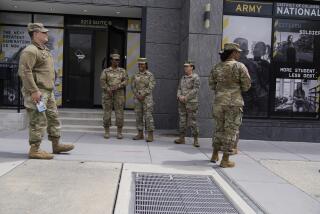NATO : In a Changed World, Turkey Moves to Cut Back Its Army
- Share via
ANKARA, Turkey — The second-biggest ground force in NATO, the Turkish army, will be cut by a third as it struggles to reconcile defense cuts with lingering external threats and a Kurdish separatist insurgency growing within Turkey’s borders.
The word comes from Dogan Gures, Turkey’s chief of staff. With elaborate politeness, the tall, straight-backed officer asked a fellow general to bring him a tray of cigarettes before his hand swept over a giant relief map to show what a rough neighborhood this continent-straddling U.S. ally inhabits.
“Syria is rearming. Iran is rearming. Russia’s Black Sea Fleet is extremely powerful. Iraq may take 15 years to recover, but it is still unstable,” Gures said in a rare interview. “For Turkey, the threat lies only just under the risks.”
But economic considerations, Gulf War lessons in maneuverability and a real reduction in the threat of surprise attack has persuaded the Ankara government to streamline and modernize its armed forces, which for decades guarded one-third of the North Atlantic Treaty Organization’s front with the Warsaw Pact.
Starting late this year, the mainly conscript army of 450,000 men will be reduced to 300,000 or less within two to three years, according to Gures. The divisional-regimental organization will be dissolved in favor of a more flexible brigade-based army.
Recruitment of 20,000 enlisted specialists has begun in the past year, and conscription is being gradually reduced to 12 months from the current 18-month period, Gures said.
The armed forces, however, still see themselves as guardians of the pro-Western, secular heritage of the founder of the republic, Kemal Ataturk, a role that has tempted them to intervene in Turkish politics no fewer than three times since 1960.
Gures has publicly declared that democracy must not be interfered with again, but he shows no sign of dispensing with the military’s profound social and educational role. The army is regarded by many as a rite of passage to manhood, and polls show it is one of the country’s most respected institutions. But foreign diplomats point out that this extra-military role is probably the single biggest factor holding up the army’s transition to a professional, modern force.
The 600,000-man military consumes 5% of the country’s gross domestic product, one of the highest ratios in NATO, the diplomats say.
And while the external threat to Turkey may have decreased, the Kurdistan Workers Party (PKK) insurgency in southeast Turkey is posing an ever greater threat.
In theory, this 7-year-old conflict is being fought by jandarma, rural police under the control of a civilian state-of-emergency governor. In practice, the army has great influence and is the source of most senior jandarma officers.
The rural police are being given more men, training and equipment, Gures said, to help them regain control of regions where, he acknowledged, the guerrillas often hold sway.
President Turgut Ozal has said that security forces are preparing for a major offensive against the guerrillas in the spring to crush a rebellion that has killed 3,300 people since 1984 and shows signs of growing.
Gures says the PKK has won influence through fear, stoking up Kurdish nationalism among unemployed youths and accumulating money through the trans-Turkey heroin trade. “We must defeat this fear,” he added.
The general gave a long sigh in describing what he considers Europe’s folly in allowing Turkey’s role in regional security to become diminished, despite opposition from Britain and the United States.
“Turkey . . . is the bridge between Europe and the risks of the Middle East. The unstable areas are all around us,” he said. “I don’t see how they will do without Turkey.”
More to Read
Sign up for Essential California
The most important California stories and recommendations in your inbox every morning.
You may occasionally receive promotional content from the Los Angeles Times.













